PHUKET: The European Union's premature lifting of all targeted sanctions on Burma means the EU will need a new platform to press the government to improve the country's still dire human rights situation, Human Rights Watch said today.
On April 22, 2013, EU foreign ministers ended decades of EU travel bans and targeted sanctions on Burmese army and government individuals and entities, except its export ban on arms.
''The EU's scrapping of targeted sanctions on Burma is premature and recklessly imperils human rights gains made so far,'' said Lotte Leicht, EU director at Human Rights Watch.
''EU member states are ditching measures that have motivated the current progress and gambling on the good will of Burma's government and military to keep their word to keep reforms on track.''
In April 2012, EU foreign ministers suspended for one year all sanctions on Burma with the exception of its arms embargo, and outlined benchmarks to gauge progress to guide a future decision on lifting sanctions.
These benchmarks included the release of all remaining political prisoners; the end of conflict, particularly in Kachin State; improved access for humanitarian assistance throughout the country; and increased assistance and improved treatment of ethnic Rohingya Muslims.
Many of these benchmarks are similar to guarantees made by President Thein Sein, in November 2012, ahead of the visit by US President Barack Obama.
Instead of the expected progress, each of these benchmarks currently remains unfulfilled or progress is stalled, Human Rights Watch said.
The prisoner review mechanism that the government promised would decide on the cases of the estimated 240 political prisoners was only formed in February and has met briefly only a few times.
Participating members from nongovernmental groups have expressed dissatisfaction with the mechanism's scope and mandate. The slow pace of legal reform has meant that many repressive laws used by past military governments remain on the books, and hence available to stifle dissent and detain peaceful activists.
In Kachin State, a fear of continued fighting and abuses has kept the more than 80,000 displaced Kachin from returning to their homes despite a February ceasefire between the government and the rebel Kachin Independence Army.
The government continues to severely restrict humanitarian access to displaced persons in KIA-controlled areas who urgently need food, medicine, and adequate shelter.
''Gushing superlatives appear to have replaced objective assessments in EU decision-making on Burma,'' Leichtsaid.
''The onus is now on EU member states to individually and together speak out publicly for progress on rights both directly with the Burmese government and in international forums.''
Of immediate concern is the government campaign of ''ethnic cleansing'' against the Rohingya minority in ArakanState and the displacement of over 125,000 people, which Human Rights Watch detailed in a just-released report, 'All You Can Do is Pray.'
The government has allowed only limited and inadequate humanitarian access to Rohingya populations at risk. Senior EU officials have warned that displaced Rohingya are facing ''a humanitarian disaster'' with the rainy season just weeks away.
The thousands of Rohingya in displaced persons camps and other areas have been denied freedom of movement, and suffer persistent persecution and violence from local authorities with the backing of state security forces.
This discrimination places them at greater risk of abuse, Human Rights Watch said.
''The lifting of EU sanctions could not come at a worse time for the Rohingya at risk in Arakan State,'' Leichtsaid.
''The EU should now redouble its efforts to get aid to those already suffering from aid shortages and press hard on the government to end its repressive policies and practices against the Rohingya.''
During President Thein Sein's visit to Europe in March, senior EU officials praised the government's progress on political and economic reform yet failed to adequately raise continuing human rights concerns, Human Rights Watch said.
The promised creation of a permanent presence of the United Nations Office of the High Commissioner for Human Rights with a full monitoring, reporting and capacity-building mandate remains unfulfilled.
Burma has also failed to investigate and hold accountable those responsible for past abuses, including alleged war crimes in Burma's ethnic conflict areas.
''The EU should promptly adopt a comprehensive policy defining its engagement with Burma to avoid further boosting abusive military officials and companies while advancing respect for the rights of everyone in Burma,'' Leicht said.
''The Burmese government has yet to earn the trust of many people, especially those in simmering conflict zones and ethnic areas. For them, rights protections and reform are promises unkept.''
On April 22, 2013, EU foreign ministers ended decades of EU travel bans and targeted sanctions on Burmese army and government individuals and entities, except its export ban on arms.
''The EU's scrapping of targeted sanctions on Burma is premature and recklessly imperils human rights gains made so far,'' said Lotte Leicht, EU director at Human Rights Watch.
''EU member states are ditching measures that have motivated the current progress and gambling on the good will of Burma's government and military to keep their word to keep reforms on track.''
In April 2012, EU foreign ministers suspended for one year all sanctions on Burma with the exception of its arms embargo, and outlined benchmarks to gauge progress to guide a future decision on lifting sanctions.
These benchmarks included the release of all remaining political prisoners; the end of conflict, particularly in Kachin State; improved access for humanitarian assistance throughout the country; and increased assistance and improved treatment of ethnic Rohingya Muslims.
Many of these benchmarks are similar to guarantees made by President Thein Sein, in November 2012, ahead of the visit by US President Barack Obama.
Instead of the expected progress, each of these benchmarks currently remains unfulfilled or progress is stalled, Human Rights Watch said.
The prisoner review mechanism that the government promised would decide on the cases of the estimated 240 political prisoners was only formed in February and has met briefly only a few times.
Participating members from nongovernmental groups have expressed dissatisfaction with the mechanism's scope and mandate. The slow pace of legal reform has meant that many repressive laws used by past military governments remain on the books, and hence available to stifle dissent and detain peaceful activists.
In Kachin State, a fear of continued fighting and abuses has kept the more than 80,000 displaced Kachin from returning to their homes despite a February ceasefire between the government and the rebel Kachin Independence Army.
The government continues to severely restrict humanitarian access to displaced persons in KIA-controlled areas who urgently need food, medicine, and adequate shelter.
''Gushing superlatives appear to have replaced objective assessments in EU decision-making on Burma,'' Leichtsaid.
''The onus is now on EU member states to individually and together speak out publicly for progress on rights both directly with the Burmese government and in international forums.''
Of immediate concern is the government campaign of ''ethnic cleansing'' against the Rohingya minority in ArakanState and the displacement of over 125,000 people, which Human Rights Watch detailed in a just-released report, 'All You Can Do is Pray.'
The government has allowed only limited and inadequate humanitarian access to Rohingya populations at risk. Senior EU officials have warned that displaced Rohingya are facing ''a humanitarian disaster'' with the rainy season just weeks away.
The thousands of Rohingya in displaced persons camps and other areas have been denied freedom of movement, and suffer persistent persecution and violence from local authorities with the backing of state security forces.
This discrimination places them at greater risk of abuse, Human Rights Watch said.
''The lifting of EU sanctions could not come at a worse time for the Rohingya at risk in Arakan State,'' Leichtsaid.
''The EU should now redouble its efforts to get aid to those already suffering from aid shortages and press hard on the government to end its repressive policies and practices against the Rohingya.''
During President Thein Sein's visit to Europe in March, senior EU officials praised the government's progress on political and economic reform yet failed to adequately raise continuing human rights concerns, Human Rights Watch said.
The promised creation of a permanent presence of the United Nations Office of the High Commissioner for Human Rights with a full monitoring, reporting and capacity-building mandate remains unfulfilled.
Burma has also failed to investigate and hold accountable those responsible for past abuses, including alleged war crimes in Burma's ethnic conflict areas.
''The EU should promptly adopt a comprehensive policy defining its engagement with Burma to avoid further boosting abusive military officials and companies while advancing respect for the rights of everyone in Burma,'' Leicht said.
''The Burmese government has yet to earn the trust of many people, especially those in simmering conflict zones and ethnic areas. For them, rights protections and reform are promises unkept.''

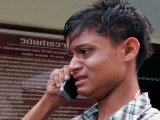







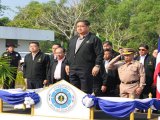
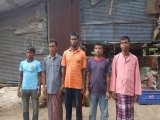
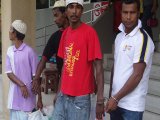
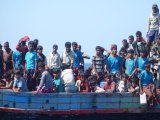
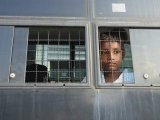

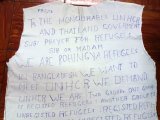
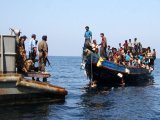



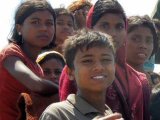
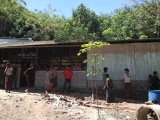

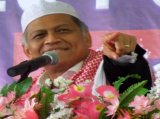
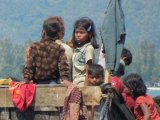

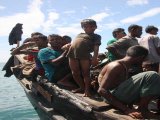
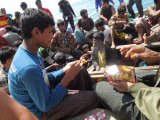




Okay so Burma acknowledges the Rohingya as citizens and they can apply for and receive passports.
If I was a Rohingya the first thing I would do would be to apply for residence in the west.
Hey I am a poor persecuted Rohingya refugee!
Can't help thinking that Europe/US and Oz etc have not thought this through?
Sad but .....?
Posted by David on April 23, 2013 09:46
Editor Comment:
Oh yes, they've thought it through. Burma = new pal in Asia = strategic partner between Indian and China = resource rich = new trading post = fresh place to relax. Rohingha = stateless = worthless = valueless = persecuted = no gain for us.